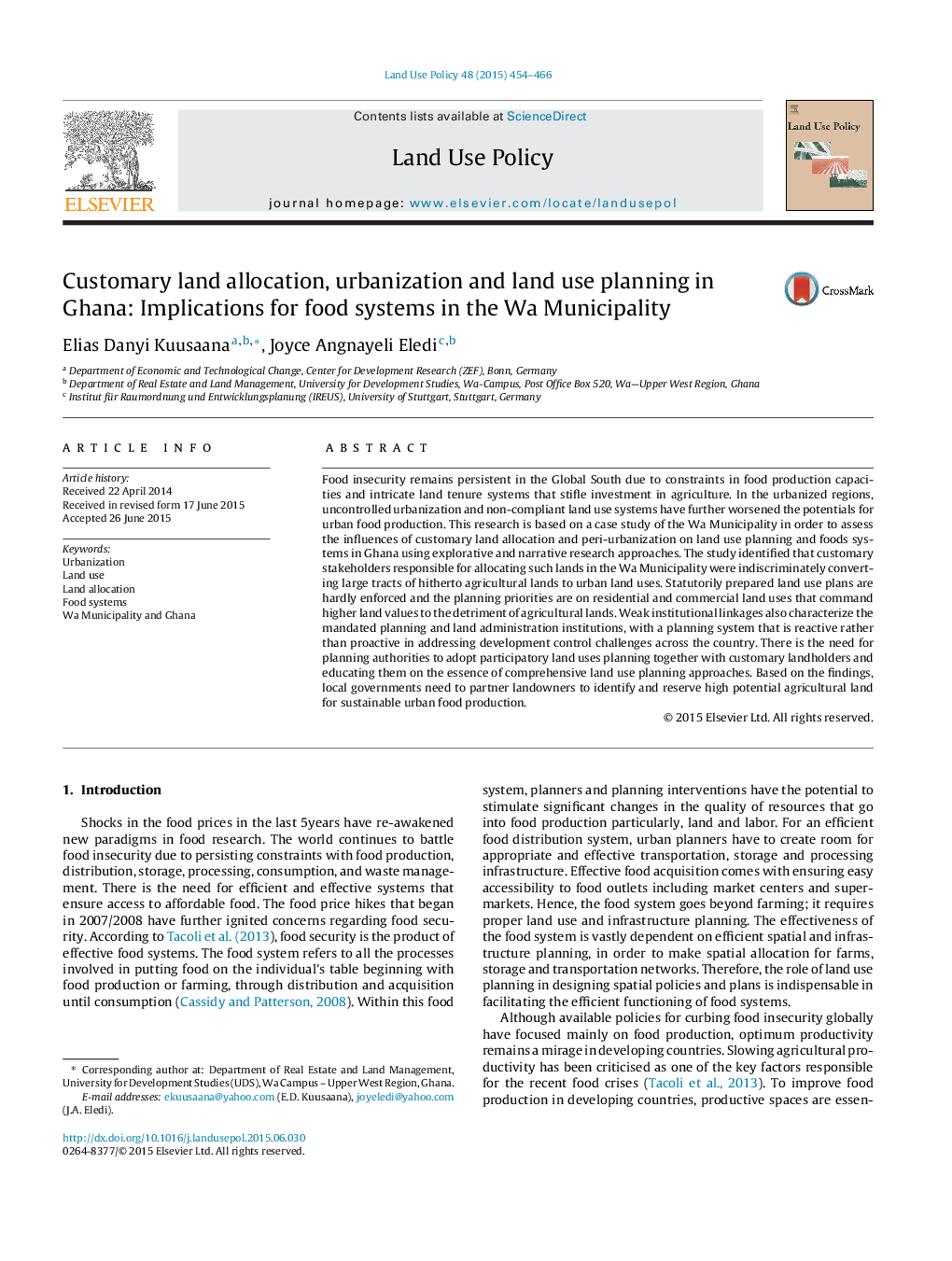| کد مقاله | کد نشریه | سال انتشار | مقاله انگلیسی | نسخه تمام متن |
|---|---|---|---|---|
| 6548010 | 160105 | 2015 | 13 صفحه PDF | دانلود رایگان |
عنوان انگلیسی مقاله ISI
Customary land allocation, urbanization and land use planning in Ghana: Implications for food systems in the Wa Municipality
ترجمه فارسی عنوان
تخصیص زمین متعارف، برنامه ریزی شهری و برنامه ریزی زمین در غنا: پیامدهای سیستم غذائی در شهرداری و
دانلود مقاله + سفارش ترجمه
دانلود مقاله ISI انگلیسی
رایگان برای ایرانیان
کلمات کلیدی
شهرنشینی، استفاده از زمین، تخصیص زمین، سیستم های غذایی، و شهرداری و غنا،
ترجمه چکیده
ناامنی غذایی در جنوب جهانی با توجه به محدودیت های موجود در ظرفیت تولید مواد غذایی و سیستم های اجرایی پیچیده زمین که مانع سرمایه گذاری در بخش کشاورزی می شود، همچنان پایدار است. در مناطق شهری، شهرنشینی کنترل نشده و سیستم های استفاده غیرمسئول از زمین، پتانسیل تولید مواد غذایی شهری را بدتر کرده است. این تحقیق بر مبنای مطالعه موردی شهرداری وای به منظور ارزیابی تأثیرات تخصیص زمین های معمول و محیط زیست در برنامه ریزی و ساماندهی استفاده از غذا در غنا با استفاده از رویکردهای تحقیقاتی و تحقیقاتی است. این مطالعه مشخص کرد که ذینفعان معمولی که مسئولیت تخصیص چنین زمین هایی را در شهرداری و وحشی می دانند، به طور مخالف تبدیل بسیاری از اراضی کشاورزی شده به زمین را به استفاده از زمین های شهری تبدیل می کنند. برنامه های مربوط به زمینۀ قانونی تهیه شده به سختی اجرا می شود و اولویت های برنامه ریزی در زمین های مسکونی و تجاری مورد استفاده قرار می گیرد که ارزش زمین های بالاتر را به ضرر زمین های کشاورزی اداره می کند. پیوندهای نهادی ضعیف همچنین برنامه ریزی های مورد نیاز و نهادهای اداری زمین را با سیستم برنامه ریزی که واکنش پذیر است، به جای پیشگیری از چالش های کنترل توسعه در سراسر کشور، مشخص می کند. نیاز به برنامه ریزی مقامات برای اتخاذ برنامه های کاربردی مشارکتی همراه با مالکیت های عادی و آموزش آنها بر اساس روش های جامع برنامه ریزی استفاده از زمین وجود دارد. بر اساس یافته ها، دولت های محلی مجبور به همکاری مالکان زمین برای شناسایی و رزرو زمین های بالقوه بالقوه کشاورزی برای تولید محصولات غذایی پایدار شهری هستند.
موضوعات مرتبط
علوم زیستی و بیوفناوری
علوم کشاورزی و بیولوژیک
جنگلداری
چکیده انگلیسی
Food insecurity remains persistent in the Global South due to constraints in food production capacities and intricate land tenure systems that stifle investment in agriculture. In the urbanized regions, uncontrolled urbanization and non-compliant land use systems have further worsened the potentials for urban food production. This research is based on a case study of the Wa Municipality in order to assess the influences of customary land allocation and peri-urbanization on land use planning and foods systems in Ghana using explorative and narrative research approaches. The study identified that customary stakeholders responsible for allocating such lands in the Wa Municipality were indiscriminately converting large tracts of hitherto agricultural lands to urban land uses. Statutorily prepared land use plans are hardly enforced and the planning priorities are on residential and commercial land uses that command higher land values to the detriment of agricultural lands. Weak institutional linkages also characterize the mandated planning and land administration institutions, with a planning system that is reactive rather than proactive in addressing development control challenges across the country. There is the need for planning authorities to adopt participatory land uses planning together with customary landholders and educating them on the essence of comprehensive land use planning approaches. Based on the findings, local governments need to partner landowners to identify and reserve high potential agricultural land for sustainable urban food production.
ناشر
Database: Elsevier - ScienceDirect (ساینس دایرکت)
Journal: Land Use Policy - Volume 48, November 2015, Pages 454-466
Journal: Land Use Policy - Volume 48, November 2015, Pages 454-466
نویسندگان
Elias Danyi Kuusaana, Joyce Angnayeli Eledi,
